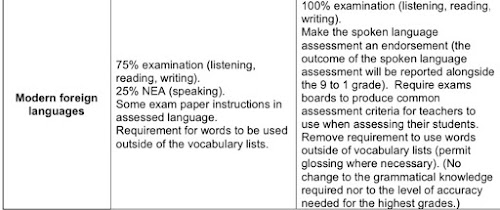In the face of “lost” teaching time during lockdown, the proposals aim to free up teaching time and, in some instances, reduce what needs to be taught and take account of any public health restrictions relating to coronavirus (COVID19) that might be in place during the next academic year.
A
“recovery” curriculum?
There have
been lots of discussions about how current Year 10 and Year 12 pupils have been
affected by the pandemic in the preparation for next year’s exams as they have had
limited access to face-to-face teaching since the end of March. In particular,
the debate has been around the need of a possible “recovery” curriculum or at
the very least a “responsive” curriculum to deal with the knowledge gaps that
may have developed and that could hinder students’ further progress. This has
highlighted the differences between school settings and the pressure on some
schools to narrow the curriculum for some pupils to ensure standards in Maths
and English were not put at risk.
Consultation
about assessment NOT Curriculum review
What this
consultation is not, is some kind of a statement about the importance of
subjects and their respective content and skills. However, you would be
forgiven for believing this was the case, reading some of the online debates it
has created.
Suggestions
for Languages A Level and GCSE 2021 exams
Whereas no modifications
have been put forward for A Level, the proposals for Modern Languages GCSEs are
quite controversial : the Speaking examination would be replaced by a teacher “endorsement”
for Speaking but it would not actually count in the exam, with the overall grade
only taking Listening, Reading and Writing into account.
Although
there is no denying that cancelling speaking exams would result in gained
teaching time, this proposal also causes a number of issues:
Students
do usually well in speaking
even though it can be stressful for some ;
There would
be a noticeable imbalance in the overall grade between the productive
and receptive skills ;
Although
speaking would still be taught, it may lose its priority in the face of further
time constraints and the pressure of imposed subject targets ;
The class
focus moving away from speaking would particularly affect pupils from
disadvantaged backgrounds who may not have opportunities for further
practice ;
The decision
would most likely impact on A Level recruitment for 2021-22 as the perceived
success in speaking the language is key for motivation and enjoyment. However, given
that the basis for the decision to carry on with languages for many students is
still “success” measured by exam outcomes, ensuring a fair exam and best
outcomes might be just as important for A Level recruitment ;
There is also
a worry that dropping the speaking exam could have a negative impact on attitudes
towards speaking and languages in general in the future.
So, what
is the way forward?
Look at the coverage
of topics? The teaching of the Social Issues topic is usually kept at the
end of the course and maybe could be scrapped to make up for lost curriculum
time during the pandemic.
Go the
“Welsh way”? Keep the
assessment standards in all 4 skills and at the same level but make amendments
such as streamlining the coverage of some of the topics or skills assessed. For
instance, no translation in the reading paper or no Role-Play and Photocard in
the speaking exam. I would still be against using dictionaries in any of the
exams as I feel this could be very distracting for students.
We will
all agree that students must not have their qualification devalued and it is
important that the standards remain the same even if some aspects of the assessment are
simplified. For this reason, I believe that the overall standard of GCSEs in
modern languages cannot be maintained without any speaking being counted at all
in the overall mark.
Want to share your own views? Have your say and respond to the consultation before 16July at 11.45pm
Now is the
time to join ALL, the Association for Language Learning, our subject association, to make sure our voice is heard.
ALL is also organising a consultation webinar on Friday 10 July for all language teachers. To register, please click here.















